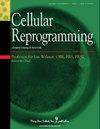旧习惯难改:DNA甲基化模式在实验转分化中持续存在。
IF 1.7
4区 医学
Q4 BIOTECHNOLOGY & APPLIED MICROBIOLOGY
引用次数: 0
摘要
通过转分化将体细胞重编程为不同的谱系,对再生医学和替代疗法具有很大的前景。然而,Radwan等人最近的一份报告(PNAS, 2024)发现,转分化细胞不能完全采用其新谱系的DNA甲基化谱。这对于转分化作为细胞替代治疗策略的可行性具有重要意义。本文章由计算机程序翻译,如有差异,请以英文原文为准。
Old Habits Die Hard: DNA Methylation Patterns Persist in Experimental Transdifferentiation.
The reprogramming of somatic cells into different lineages by transdifferentiation holds great promise for regenerative medicine and replacement therapies. However, a recent report by Radwan et al. (PNAS, 2024) finds that transdifferentiated cells fail to fully adopt the DNA methylation profiles of their new lineage. This has important implications regarding the viability of transdifferentiation as a strategy for cell replacement therapy.
求助全文
通过发布文献求助,成功后即可免费获取论文全文。
去求助
来源期刊

Cellular reprogramming
CELL & TISSUE ENGINEERING-BIOTECHNOLOGY & APPLIED MICROBIOLOGY
CiteScore
2.50
自引率
6.20%
发文量
37
审稿时长
3 months
期刊介绍:
Cellular Reprogramming is the premier journal dedicated to providing new insights on the etiology, development, and potential treatment of various diseases through reprogramming cellular mechanisms. The Journal delivers information on cutting-edge techniques and the latest high-quality research and discoveries that are transforming biomedical research.
Cellular Reprogramming coverage includes:
Somatic cell nuclear transfer and reprogramming in early embryos
Embryonic stem cells
Nuclear transfer stem cells (stem cells derived from nuclear transfer embryos)
Generation of induced pluripotent stem (iPS) cells and/or potential for cell-based therapies
Epigenetics
Adult stem cells and pluripotency.
 求助内容:
求助内容: 应助结果提醒方式:
应助结果提醒方式:


